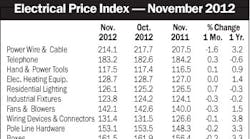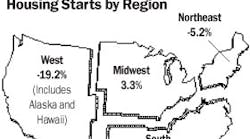David Seiders, chief economist, National Association of Home Builders, Washington, D.C., told the Senate Finance Committee last week that a second round of fiscal stimulus directed at the housing sector would boost the homebuilding industry and shore up the U.S. economy. He said the U.S. housing market is now in the most pronounced downswing since the Great Depression and, “The bottom is not yet in sight.”
“New home sales and single-family housing starts already are down by more than 50 percent from recent peaks, and the month’s supply of new homes for sale is up to nearly 10 months, with serious downside implications for future housing production,” he said. “This dramatic housing contraction has exacted a heavy toll on economic growth and employment during the past two years and has pushed the economy to the brink of recession.”
“In addition to the sharp declines in home sales and housing production, we’re also seeing falling home prices and serious declines in mortgage credit quality. These factors have taken a toll on household wealth and provoked a surge in mortgage foreclosures, a substantial decline in homeownership and serious damage to financial institutions holding mortgage assets.”
Seiders said that while the Federal Reserve has been easing monetary policy aggressively since last fall and will probably do more in the near future, the rate cuts by the Fed do not necessarily translate into lower mortgage interest rates. That’s because long-term rates include an inflation component, and if market expectations of inflation rise as the Fed eases monetary policy, then little or no benefit will be transmitted to mortgage rates, he said.
Seiders suggested to Congressional leaders that a second round of fiscal stimulus directed squarely at the housing sector would pay off for the U.S. economy a whole. The NAHB tax policy recommendations include a tax credit for the purchase of a home; the expansion of the federal Mortgage Revenue Bond program; and designation of housing as an eligible investment for tax-preferred retirement accounts.
On NAHB’s proposal for tax credits for home purchase, Seiders said, “Consumer interest in home buying appears to be perking up a bit as affordability measures improve, although home sales still are deteriorating. A temporary tax credit for home buyers could quickly energize the markets, reduce the record overhang of vacant housing units, stabilize house prices and halt the destructive decline of mortgage credit quality.”
He said NAHB supports the expansion of the Mortgage Revenue Bond (MRB) program because it offers a method of increasing housing demand and responding to foreclosure concerns. “A special allocation of bonds to be used for either purchase or refinancing would be beneficial for housing and the economy,” he said. “Expanding the reach of the MRB program would be particularly helpful for communities facing waves of foreclosures or heavy inventory conditions.
“The committee adopted this proposal during its work on the first economic stimulus bill, and we urge that it be included in any future package.”
A complete transcript of Seider’s comments is available in the most recent issue of his “Eye on the Economy” e-newsletter at www.nahbmonday.com.

